'We are not criminals' Nigerians tell their president
- Published
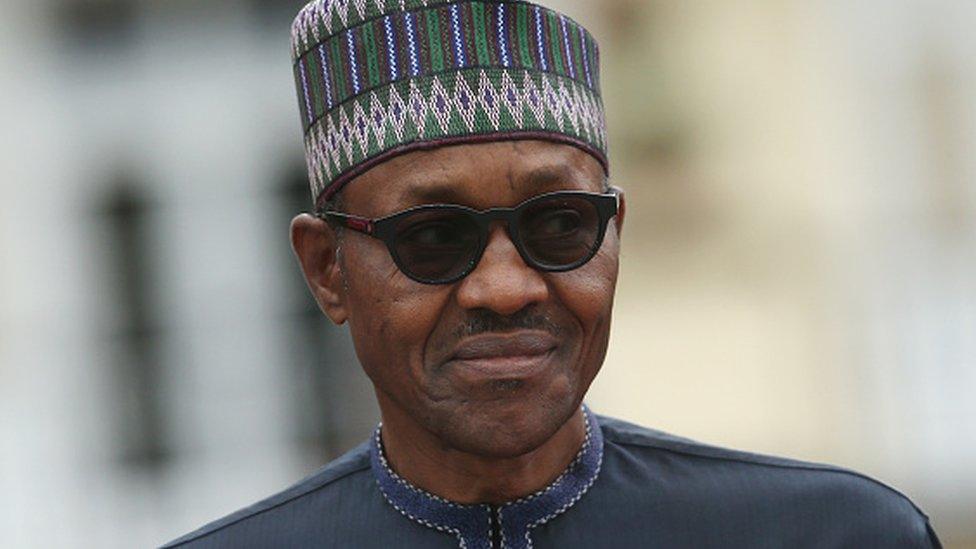
President Buhari has made no effort to backtrack on his remarks.
It's the home of the "419" scam - the infamous online swindle named after a Nigerian anti-fraud law - and it's no secret that this country's international reputation has been tainted by allegations of criminality.
But it's not something Nigerians expected to hear from the mouth of their president himself, especially while he was on an official visit to the UK.
In an interview, external with the Telegraph newspaper, President Muhammadu Buhari said that Nigerians abroad have "made it difficult for Europeans and Americans to accept them because of the number of Nigerians in prisons all over the world accused of drug trafficking or human trafficking."
"We have an image problem abroad," he said. "And we are on our way to salvage that. We will encourage our countrymen to stay at home, work hard and make a respectable living at home."
Nigerians reacted to his remarks by the thousand - with rage, humour and some insightful self-reflection too.
Opposition senator Ben Bruce-Murray was one of the first to respond, urging people to get the hashtag #IamANigerianNotACriminal trending.
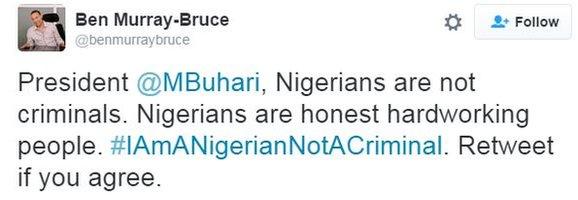
That hashtag rapidly evolved into the snappier #NigeriansAreNotCriminals which was used more than 35,000 times in a couple of days. There were a slew of tweets criticising the president for slandering the reputation of his own people.
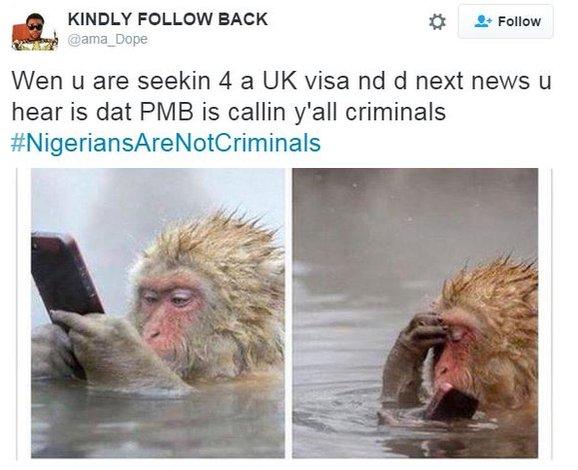
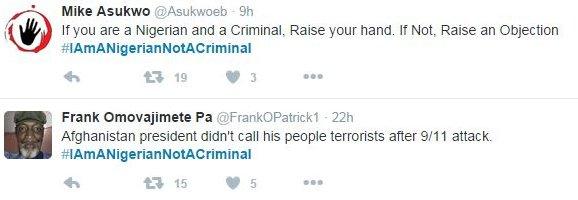
And even more celebrating honest, hard-working Nigerians at home and abroad.

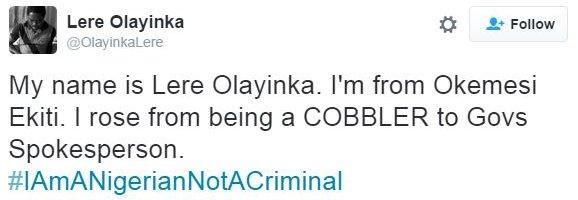
Including some tweets from the president's political opponents.
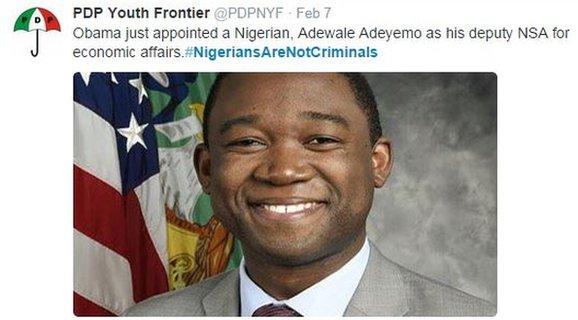
It's a thorny issue for Nigerians living abroad who feel they sometimes have to deal with stricter immigration checks and visa restrictions than people from other parts of the world. And some who believe they face heavier oversight and regulation when it comes to working in the banking and finance sectors because of their nationality.
Nigeria is in the middle of an economic crisis. Dropping oil prices mean there is less money around for investment and the value of the naira is falling rapidly.

Follow BBC Trending on Facebook
Join the conversation on this and other stories here, external.

Some people believe President Buhari's comments may make things worse, putting off investors from abroad at a time when the country really needs them.

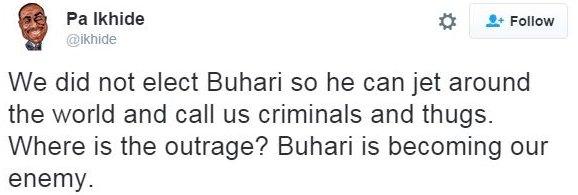
And Nigerians feel that in many respects the reputation just isn't justified. According to UK police statistics, shared by Senator Murray-Bruce, Nigerians in the UK have faced fewer arrests than immigrants from other, smaller European countries.
Despite the backlash, there was some support for what President Buhari said. The president has a reputation for plain speaking. He was voted into power last year, in a mostly fair election, on a platform of fighting corruption. As an army general in 1984 Buhari overthrew a civilian government, replacing it with a military dictatorship and made a promise to stamp out "indiscipline". He was overthrown not long after. But his reputation survived.

This latest controversy has given Nigerian politicians a chance to do on social media what they do best, slinging insults and abuse at each other - as one tweeter shrewdly pointed out in this, a 'tale of two tweets'.
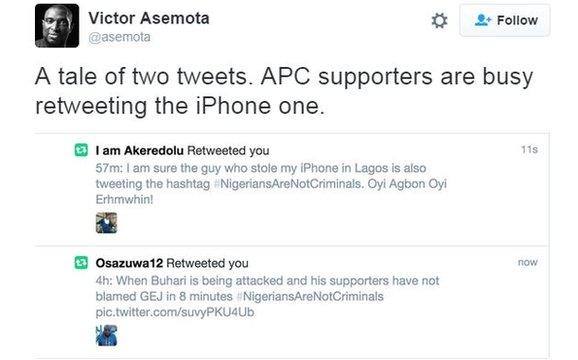
The president has now responded to the criticism via his spokesman Garba Shehu, said that Buhari's comments to the Telegraph have been misconstrued.
In a statement he said it would be absurd to think that the president, a Nigerian himself, would think all Nigerians were criminals. He said that the president had been very specifically responding to a question about Nigerians who falsely try to seek asylum in other countries.
"People may play politics and online games with the President's comments, but the fact of the matter remains that Nigeria's reputation abroad has been severely damaged by her own citizens," Shehu said. "These Nigerians who leave their country to go and make mischief on foreign shores have given the rest of us a bad reputation that we daily struggle to overcome."
Blog by Stephanie Hegarty
Next Story: Leaflets pulled due to boob over Bobby
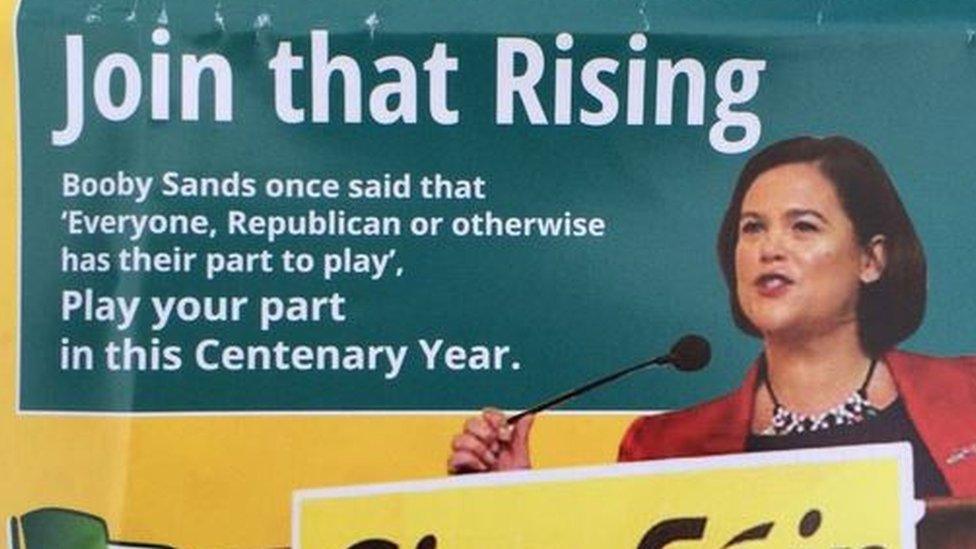
Sinn Fein withdraws an Irish election leaflet because of very unfortunate typo in the name of IRA hunger striker Bobby Sands.READ MORE